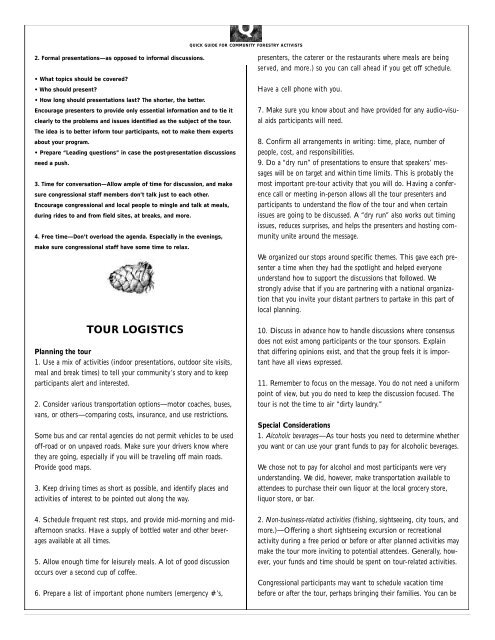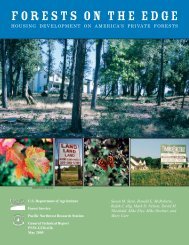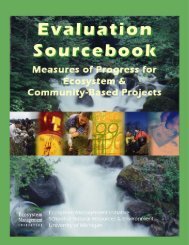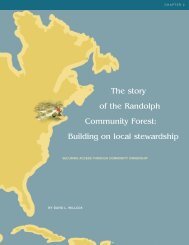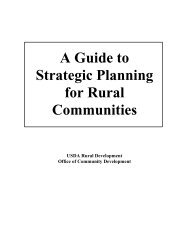Conducting Congressional Staff Field Tours - Communities Committee
Conducting Congressional Staff Field Tours - Communities Committee
Conducting Congressional Staff Field Tours - Communities Committee
Create successful ePaper yourself
Turn your PDF publications into a flip-book with our unique Google optimized e-Paper software.
QQUICK GUIDE FOR COMMUNITY FORESTRY ACTIVISTS2. Formal presentations—as opposed to informal discussions.• What topics should be covered?• Who should present?• How long should presentations last? The shorter, the better.Encourage presenters to provide only essential information and to tie itclearly to the problems and issues identified as the subject of the tour.The idea is to better inform tour participants, not to make them expertsabout your program.• Prepare “Leading questions” in case the post-presentation discussionsneed a push.3. Time for conversation—Allow ample of time for discussion, and makesure congressional staff members don’t talk just to each other.Encourage congressional and local people to mingle and talk at meals,during rides to and from field sites, at breaks, and more.4. Free time—Don’t overload the agenda. Especially in the evenings,make sure congressional staff have some time to relax.TOUR LO G I S T I CSPlanning the tour1. Use a mix of activities (indoor presentations, outdoor site visits,meal and break times) to tell your community’s story and to ke e pparticipants alert and interested.2. Consider various transportation options—motor coaches, buses,vans, or others—comparing costs, insurance, and use restrictions.Some bus and car rental agencies do not permit vehicles to be usedoff-road or on unpaved roads. Make sure your drivers know wherethey are going, especially if you will be traveling off main roads.Provide good maps.3. Keep driving times as short as possible, and identify places andactivities of interest to be pointed out along the way.4. Schedule frequent rest stops, and provide mid-morning and midafternoonsnacks. Have a supply of bottled water and other beveragesavailable at all times.5. Allow enough time for leisurely meals. A lot of good discussionoccurs over a second cup of coffee.6. Prepare a list of important phone numbers (emergency #’s,presenters, the caterer or the restaurants where meals are beings e rved, and more.) so you can call ahead if you get off schedule.Have a cell phone with you.7. Make sure you know about and have provided for any audio- v i s u-al aids participants will need.8. Confirm all arrangements in writing: time, place, number ofpeople, cost, and responsibilities.9. Do a “dry run” of presentations to ensure that speakers’ messageswill be on target and within time limits. This is probably themost important pre-tour activity that you will do. Having a conferencecall or meeting in-person allows all the tour presenters andparticipants to understand the flow of the tour and when certainissues are going to be discussed. A “dry run” also works out timingissues, reduces surprises, and helps the presenters and hosting communityunite around the message.We organized our stops around specific themes. This gave each presentera time when they had the spotlight and helped everyoneunderstand how to support the discussions that followed. Westrongly advise that if you are partnering with a national organizationthat you invite your distant partners to partake in this part oflocal planning.10. Discuss in advance how to handle discussions where consensusdoes not exist among participants or the tour sponsors. Explainthat differing opinions exist, and that the group feels it is importanthave all views expressed.11. Remember to focus on the message. You do not need a uniformpoint of view, but you do need to keep the discussion focused. Thetour is not the time to air “dirty laundry. ”Special Considerations1. Alcoholic beverages—As tour hosts you need to determine whetheryou want or can use your grant funds to pay for alcoholic beverages.We chose not to pay for alcohol and most participants were veryunderstanding. We did, however, make transportation available toattendees to purchase their own liquor at the local grocery store,liquor store, or bar.2. Non-business-related activities (fishing, sightseeing, city tours, andmore.)—Offering a short sightseeing excursion or recreationalactivity during a free period or before or after planned activities maym a ke the tour more inviting to potential attendees. Generally, howev e r, your funds and time should be spent on tour-related activities.<strong>Congressional</strong> participants may want to schedule vacation timebefore or after the tour, perhaps bringing their families. You can be


